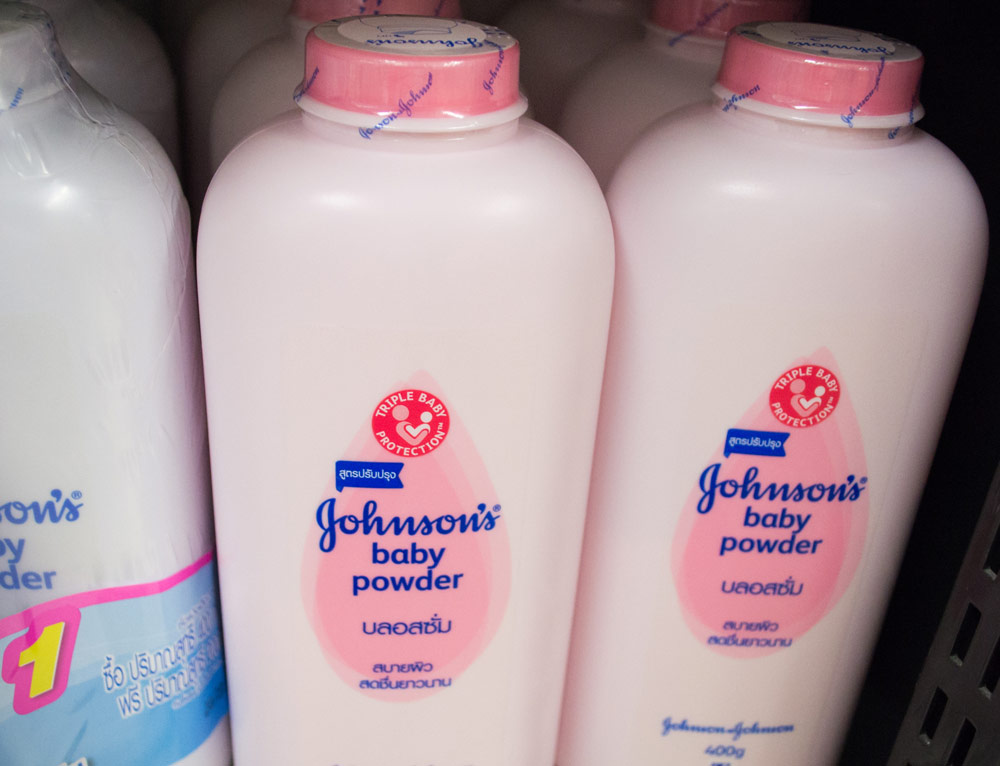Nonprofits Call for Worldwide Halt of J&J Baby Powder Sales

National advocacy group Black Women for Wellness joined more than 170 other nonprofits from 51 countries last week in demanding that Johnson & Johnson stop the worldwide distribution of its iconic Johnson’s Baby Powder.
The demand for a global distribution ban stems from the potential for asbestos in talc, which has led to various cancers and thousands of personal injury lawsuits.
A majority of talc cases pertain to women and ovarian cancer. A small percentage of the legal claims involve mesothelioma, a rare and aggressive cancer caused primarily by the inhalation or ingestion of asbestos fibers.
Johnson & Johnson announced in May that it would end talc-based baby powder sales within the United States and Canada, citing a decline in consumer demand and “misinformation” about the safety of the product.
Many advocacy groups believe the move did not go far enough, allowing the continued sale of existing inventory in the U.S. and unlimited sales around the world.
Groups Urge J&J CEO to Further Address Issues of Race
The organizations digitally signed and sent their demand for a global ban to Alex Gorsky, Johnson & Johnson chief executive officer, who had issued a statement recently supporting ongoing calls for racial justice.
Janette Robinson Flint, executive director of Black Women for Wellness, said Gorsky’s statement of support for racial justice was contradictory to the continued marketing of Johnson’s Baby Powder.
“This is a pivotal moment in our time, in our planet’s history, and a time for Johnson & Johnson to step up to the plate,” Robinson Flint told The Mesothelioma Center at Asbestos.com. “Given Mr. Gorsky’s solidarity with Black Lives Matter, we expect him to lead an accountable, corporate partner in saving the planet and the women who live here. Johnson & Johnson does not need to be dumping an unhealthy product on Black women anywhere.”
Johnson & Johnson has remained steadfast in its assertion that its talc-based baby powder is safe to use and continues to manufacture and sell the product in countries outside the U.S. and Canada where it says demand is higher.
“It’s really important they also discontinue selling it abroad, especially in places like Africa, Asia and Latin America,” Isabelle Chaudry, senior policy manager at National Women’s Health Network in Washington, D.C., told The Mesothelioma Center at Asbestos.com. “If racism in any form is unacceptable, as Alex Gorsky states, then Johnson & Johnson must address its own racist practices, including the gross targeting of Black and Brown communities.”
Vast Support Among Advocates for Global Johnson’s Baby Powder Ban
Chaudry and Robinson Flint are just two of many who believe Johnson & Johnson should discontinue selling Johnson’s Baby Powder everywhere.
Signing the demand were representatives from myriad public health, conservation, human rights and environmental health and justice nonprofits, along with educational and municipal institutions around the world.
Linda Reinstein of the Asbestos Disease Awareness Organization in the U.S., Laurie Kazan-Allen from the United Kingdom’s International Ban Asbestos Secretariat and Anna Nowak of National Centre for Asbestos Related Diseases in Australia were among the signees.
Johnson & Johnson continues to fight the lawsuits against it aggressively. It lost its latest legal fight in June when a Missouri Court of Appeals upheld an earlier Johnson & Johnson talc-asbestos verdict saying that its talc products had caused ovarian cancer in 22 women. Johnson & Johnson said it would appeal again in the state Supreme Court.
Asbestos in Talc Still Being Debated
The hidden dangers of talc contaminated with microscopic asbestos fibers stem from the mining of the two naturally occurring minerals. They often are found in close proximity near the Earth’s surface.
Earlier this year, the U.S. Food and Drug Administration announced it had found asbestos in nine of 52 cosmetic-talc products it tested during a year-long study. Johnson’s Baby Powder was one of the nine. The other eight were women’s makeup products.
Various methods of testing for contamination often are at issue.
“Decades of independent scientific studies by medical experts around the world support the safety of Johnson’s Baby Powder. We continue to offer this product in many other regions around the world, where there is higher consumer demand,” Johnson & Johnson said in a statement last week.